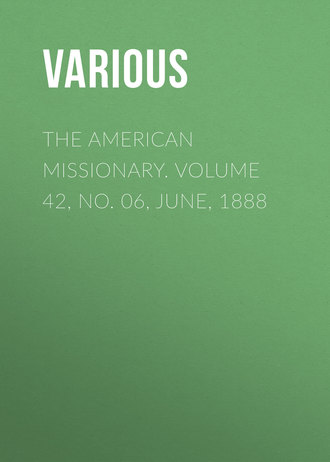 полная версия
полная версияThe American Missionary. Volume 42, No. 06, June, 1888
THE ALABAMA ASSOCIATION
PRESIDENT H.S. DEFOREST.
The thirteenth annual meeting of the Alabama Association was held at Salma, March 30th to April 3d, when the floods were at their highest, yet fourteen of our seventeen churches were represented. The Sunday-school Association convened a day earlier, and one afternoon the Woman's Missionary Association had a session by itself.
The opening sermon by Professor Andrews, was a powerful exposition of Christian love, from the 13th of 1st Corinthians. One evening was given to the higher, Christian education; one to three papers on "How to Secure Homes," "The Home Indoors," and "Home Piety;" and the last to three phases of the temperance question. Pastor C.B. Curtis, whose church most generously entertained the Association, read a very suggestive paper on "Self Support of the Churches," a pressing and difficult question. Almost of necessity, when there is so much to be done, and the resources are so small compared with the magnitude of the undertakings, practical rather than theoretical questions come to the front and engage earnest attention.
After a most satisfactory examination, six young men from the Theological Department of Talladega College were licensed to preach, and it is noteworthy, that, besides this latest gift of Talladega to the ministry, eleven of the fourteen churches represented at this meeting of the Association are ministered to by Talladega College or its graduates. It is a wonder that some man wishing to put a comparatively small sum of money where it would increase with a compound interest of blessedness till the latter-day glories have fully come, does not endow the chair of Theology at Talladega, and his brothers take up the same line of usefulness till both College and Seminary are presided for. Some who were taking the rudiments of learning here but a few years ago, and who have continued their training at very email expense, are now acceptably filling difficult and responsible positions in school, in business and in church. There is more of this work to be done, and to be allowed to help seems a privilege precious enough to make life vastly desirable.
TEMPERANCE WORK IN OUR SCHOOLS
Our esteemed neighbor at 58 Reade Street, Mr. J.N. Stearns, Publishing Agent of the National Temperance Society, recently made a visit to Florida. On his return trip, he visited several of the A.M.A. schools in the South, and his practiced eye of course detected the facts in regard to temperance instruction and influence. We quote the following items:
At Beach Institute, Savannah, under care of the American Missionary Association, Miss A.A. Holmes principal, I found 230 pupils and a strong temperance sentiment. The entire school receives sound temperance instruction. Stirring temperance songs ring through the halls. A Band of Hope holds regular meetings. "Mother Goose and Her Temperance Family," was performed with great satisfaction by the pupils, and a photograph group of the actors taken and preserved as a memento of the occasion. "Alcohol and Hygiene" and the "Catechism on Alcohol" are among the studies.
At Charleston I found Avery Institute slowly recovering from the effects of the earthquake which effectually scattered its students. Over 200, however, were now in attendance, under the auspices of the American Missionary Association, with Professor M.A. Holmes principal. Temperance is a cardinal virtue here, but they greatly need a temperance library and other literature. All these schools have a severe struggle to sustain their ordinary work, and must depend largely upon outside help for temperance literature. They can use to great advantage and carefully distribute, without expense, to the community round about if only the material is furnished.
At Wilmington, N.C., a great work has been accomplished. It has 20,000 inhabitants, 12,000 of which are colored. In 1881, when the vote on prohibition was taken in the State, it was all against the proposition. A wonderful change for the better has taken place. I had a most pleasant visit to Gregory Institute of 250 pupils, Mr. George A. Woodard principal. This is also under the American Missionary Association. "Alcohol and Hygiene" is taught in the higher branches and temperance pervades every department. An open temperance society, with Rev. George S. Rollins president, holds regular evening meetings, with temperance songs, recitations, dialogues, essays and speeches, for entertainment and instruction. The regular meeting occurred the evening I was in town, and I greatly enjoyed the exercises. Carolina Mills was proposed for membership, and a committee of three appointed to "investigate and report." The report was "favorable," and read in regular order and adopted. The candidate came forward to take the pledge, and proved to be a young man of genuine African descent. The entire programme was rendered with great credit to all concerned.
THE INDIANS
LETTER FROM AN INDIAN CHIEF IN DAKOTA
My Dear Sir:–Will you Please I have got your letter and I was vey glad—and vey Good letter—and I tell My Indian friends all good men and We are vey glad to see your good paper. And, Now, We Mandans Indian We are maken houses this River south sides and We are farmes And we have Great fields—and We like Vey much the White man Ways—and We are White mans—and We are a Friends to the White, and We hear much talk of you and we are good Indians Mandans. We do not do foolish to the Whites, and We are a good Friends to the Whites–And now I wants to know the Great Fathers Wishes to us. Please good tell me the Great fathers what he say to us—When you get this letter Please Write to me Yery soon. Good buy—
I am Very your truly friends,MR. WOLFE, Chief.Fort Berthold West, 30 miles from here I live and have 16 acres and I am glad. I have a cow, 6 horses, a wagon, a plow. I have three houses and a store. I live south side this River. Yours,
MR. WOLFE, Chief.THE CHINESE
EVANGELISTIC WORK
It is now nearly five months since our evangelists went forth, and the record of their work, if I had both grace and space to give it in graphic detail, could not but interest the readers of the MISSIONARY. Chin Toy was to labor in our more northern missions, viz., Stockton, Sacramento, Marysville and Oroville, and Loo Quong was to go south to Santa Barbara and San Diego and certain other cities where Chinese had congregated, but in which there appeared to be none to care for their souls. Subsequently another brother entered the field, Yong Jin, laboring first at Santa Cruz, and now at Tucson, Arizona.
The intention was to give one month of service at each mission, and one gratifying feature of our experience has been that at no point has this one month been deemed sufficient. In every case an urgent plea has come for a longer visit and a larger work. In some cases, as with Chin Toy in Sacramento, and Loo Quong at San Diego, it has been necessary to yield to these appeals. The work needed could not be fulfilled in the month assigned. But in general we have adhered to the original plan, so as to cover the whole field.
The results have justified the undertaking. The work of these brethren has been greatly blessed, first of all, to those who were already believers in Jesus. They have been taught the truth more perfectly. They have had their conceptions of a Christian's duty and a Christian's privileges raised. They have been brought into closer harmony with each other. It is too much to expect, perhaps, in view of facts as they transpire in churches of American Christians—Christians "to the manner born"—that our little groups of Chinese believers born as "aliens from the commonwealth of Israel and strangers to the covenants of promise," should be free from all envies and jealousies, walking always in brotherly love. We wish it were so, but our wish is, as yet, but partially fulfilled. Our evangelists have so presented Christ, and so magnified the duty and the blessing of brotherly love, and so exercised, also, their gifts of Christian diplomacy, as to become peace-makers, and to restore a truly spiritual order at points where chaos seemed impending.
They have been "in labors abundant." The following from Yong Jin, at Santa Cruz, puts in fewest words their ordinary work: "This school has nineteen or twenty scholars. About sixteen come to take the lesson every evening. Mrs. Willett teach and I teach. [i.e. during the usual school session from 7 till 9 p.m.] After the school is out, I teach them the Bible lesson about half so long. [i.e. from 9.15 till 10.15 p.m.] Monday, Tuesday and Thursday evenings gave them the Bible lesson of Chinese. Wednesday and Friday evenings, the Bible lesson of English. Saturday evenings we have meeting. Sunday noon, I did preach in the street—three times since I came here." With this is associated constant visiting of such Chinese as either cannot or will not attend the school, seeking to sow beside all waters. Also study; in some cases aided through the kindness of some resident pastor, for these brethren have entered upon this work untrained except in the work itself, and one point of greatest moment in their present service is to learn how to render better service in the years to come. Street preaching is undertaken wherever possible. What a hearing can be secured if only some American Christians will cooperate, was well illustrated in the experience of Loo Quong at San Diego. I cite the following sentences: "This afternoon we have a grand time in preaching the good news of Jesus to the Chinese. There were more than ten good people who had gathered there to help me in the singing. After half an hour of hard talk, [i.e., earnest laborious speaking,] then Mr. Kirby, an old gentleman, next is Rev. Dr. Harwood, then a stranger.
All these speakings I have put in Chinese and they were listened to by at least a thousand Chinese and whites. Among the helpers were Mrs. Noble and Mrs. McKensie and the whole family of Rev. Dr. Harwood. Besides these were many other good Christian ladies who stood around me and were given willing lips to join the singing. I cannot tell you all about our street preaching here. I will leave it for you to think about and enjoy. Amen."
God has used this preaching of the Word, not only to edify the brethren, but to bring men to repentance. The numbers may seem small when compared with those reported by our American evangelists laboring among the tens of thousands in our great cities, but, under the circumstances, they are very cheering. At Stockton, 1; Sacramento, 1; San Buenaventura, 3; San Diego, 3; Oakland, 4; San Francisco, 5; Tucson, 5; Santa Barbara, 7; Santa Cruz, 11. Total 40. This is the harvest of the past five months. If the work of the whole year should yield corresponding returns, it will be the most fruitful of our whole history. Much remains unsaid, for which I may find space hereafter.
WM. C. POND.
The Chinese have been considered by many impervious to Christian influence, but the following paragraph shows that by "deeds, not words," the Oriental, sometimes, expresses his gratitude. Sometime ago a Chinaman in a Sunday-school was taken ill, and, through the influence of its superintendent, admission to a hospital was secured, until he was able to return to his native land. But no word of thanks was given for the faithful care and unwearied attentions he had received, and only the assurance of the Master's approbation cheered the hearts of those who had sowed the gospel truth in his name. The weeks went by, when from over the sea came a living testimony of the gratitude of this Chinamen in the form of his young son, whom he had sent to America with the injunction to find the unforgotten superintendent, and go to her Sunday-school. For five months now he has been under her care, and at the recent reception given by the Chinese scholars to their teachers, on their New Year, he wrote in a clear, well-defined hand, every word correctly spelled, this letter to his teacher, who had sent him her regrets that she could not be present.
My Dear Teacher:
I thank you for your letter. I am sorry you could not come to the supper last Monday night. I am glad you can teach me every Sunday. I like to go to Sunday-school. Please write to me again.
Yours truly–
Five months ago this boy was unable to speak or understand a word of English; now he can read, write, and repeat the Lord's Prayer from memory, a task he studied long and patiently to accomplish.
BUREAU OF WOMAN'S WORK
MISS D.E. EMERSON, SECRETARY.
WOMAN'S STATE ORGANIZATIONS
CO-OPERATING WITH THE AMERICAN MISSIONARY ASSOCIATION
ME.—Woman's Aid to A.M.A., Chairman of Committee, Mrs. C.A. Woodbary, Woodfords, Me.
VT.—Woman's Aid to A.M.A., Chairman of Committee, Mrs. Henry Fairbanks, St. Johnsbury, Vt.
CONN.—Woman's Home Miss. Union, Secretary, Mrs. S.M. Hotchkiss, 171 Capitol Ave., Hartford, Conn.
N.Y.—Woman's Home Miss. Union, Secretary, Mrs. C.C. Creegan, Syracuse, N.Y.
ALA.—Woman's Missionary Association, Secretary, Mrs. G.W. Andrews, Talladega, Ala.
OHIO.—Woman's Home Miss. Union, Secretary, Mrs. Flora K. Regal, Oberlin, Ohio.
ILL.—Woman's Home Miss. Union, Secretary, Mrs. C.H. Taintor, 151 Washington St., Chicago, Ill.
MICH.—Woman's Home Miss. Union, Secretary, Mrs. Mary B. Warren, Lansing, Mich.
WIS.—Woman's Home Miss. Union, Secretary, Mrs. C. Matter, Brodhead, Wis.
MINN.—Woman's Home Miss. Society, Secretary, Mrs. H.L. Chase, 2,750 Second Ave., South, Minneapolis, Minn.
IOWA.—Woman's Home Miss. Union, Secretary, Miss Ella E. Marsh, Grinnell, Iowa.
KANSAS.—Woman's Home Miss. Society, Secretary, Mrs. Addison Blanchard, Topeka, Kan.
SOUTH DAKOTA.—Woman's Home Miss. Union, Secretary, Mrs. S.E. Young, Sioux Falls, Dak.
The Woman's Missionary Association of Alabama held its annual meeting in connection with the State Association, April 2d, at Selma. The meeting was well attended, and encouraging reports were had from many of the auxiliaries. The advantage of the local missionary societies to the church and Sunday-school work was emphasized, and a desire for more thorough local work was very apparent in the meeting. Many subjects of interest were discussed. Among them the following: Industrial Training in our Schools; Industrial Training in our Homes; Should there be a Woman's Missionary Society in every church? If so, the reason why every sister in the church should be a member; What shall we do to make our Local Societies more active?
Greetings of the Second Woman's Temperance Union of Alabama, were presented at this meeting. This Union is composed of colored women of various views, together with Northern missionaries and teachers. There is no doubt that their work for purity and sobriety is most efficient, yet this Union can have no dealings with the other Union, though color hinders neither of the vices which the Unions oppose.
The Woman's Home Missionary Union of Michigan leads with "Lesson Leaves" for its auxiliaries on the work of the different National Societies. We give the programme for the A.M.A. for the benefit of any who may wish to follow this example.
Hymn.—"Work, for the night is coming."
Bible Reading.—I Chronicles 29: 1-18.
Special Subject for Prayer.—That obstacles in the way of the speedy coming of Christ be removed.
First Topic.—When, Where and How did this Society originate? (See "History of American Missionary Association," also "A Catechism.")
Second Topic.—What are some of the results and a general summary of the work done in forty-six years? (See same papers, and also "Pamphlet No. 10—Forty Years of Missionary Work, Past and Present.")
Third Topic.—What are the four grand divisions of its work, and where are its various fields of operations? (See same papers.)
Fourth Topic.—When was the Bureau of Woman's Work organized, and what is its special department? (See "Forty Years of Missionary Labor," page 17; also, Leaflet "Bureau of Woman's Work," "Freed Women of the South," and "Sewing Needed.")
For pamphlets and leaflets mentioned above, apply to Miss D.E. Emerson, 56 Reade St., New York.
The ladies in the North who are engaged in every good work for the Lord will be glad to find that there are those in the South who share their burdens, and their faith, also. The letter below was written by one of our most intelligent and earnest Christian workers—a colored lady educated in one of our schools.
"Our usual lines of work have gone on with about the same results, except among the women. Our Woman's Prayer Meeting shows unusual fervor, and we are expecting to make this meeting felt in the community and church. Satan seems on the war-path, and we women feel that we must be wide-awake and closer to the Lord, if the power of evil is to be checked. In our last meeting the one feeling each expressed was: 'What can I do? I feel that I am called to work for the Master, but what can I do for Christ?' In the struggle for bread, the time of many of the women is used all the day; then the house must be cared for, and when this is done, strength fails. I tried to impress the thought that much is gained when a soul is anxious to work for the Lord, and that such a soul will not be left unguided, which seemed to comfort many a tired mother.
"My difficulty is different. I am perplexed to know which of the many phases of Christian work to adopt for these women, and how to keep up interest and attendance without multiplying meetings. I am confident that our regular four weekly meetings and the regular monthly meetings are all they can attend, yet they need others. I am often reminded of my dear mother's prayer which she used to cry out when greatly tried in the days of slavery: 'Oh! for Job's patience and Joshua's resolution, that we might all pull together like Pharaoh's horses.' And I would add: 'Oh! for Solomon's wisdom and Samson's strength, that we might understand and do the Lord's work.'"
RECEIPTS FOR APRIL, 1888
MAINE, $224.38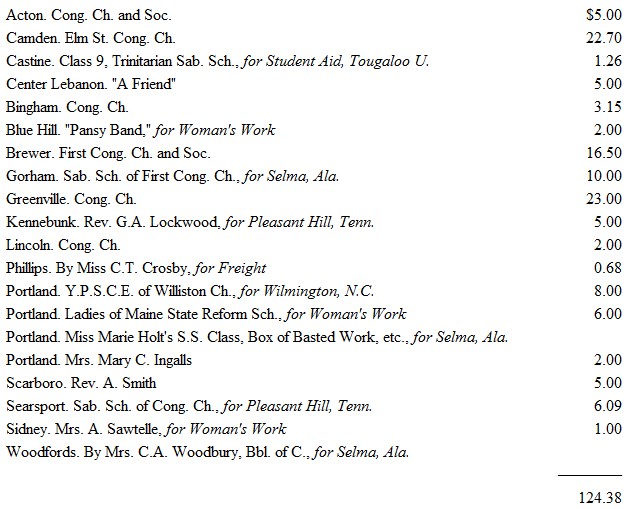

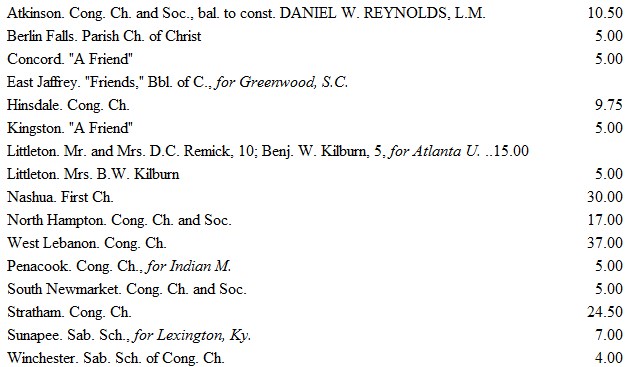
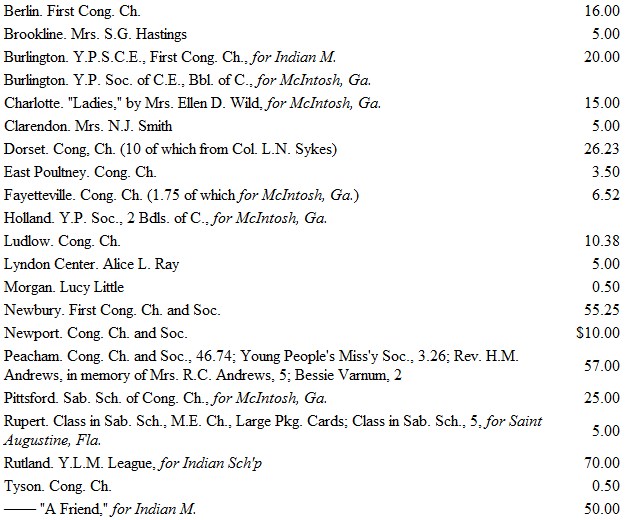
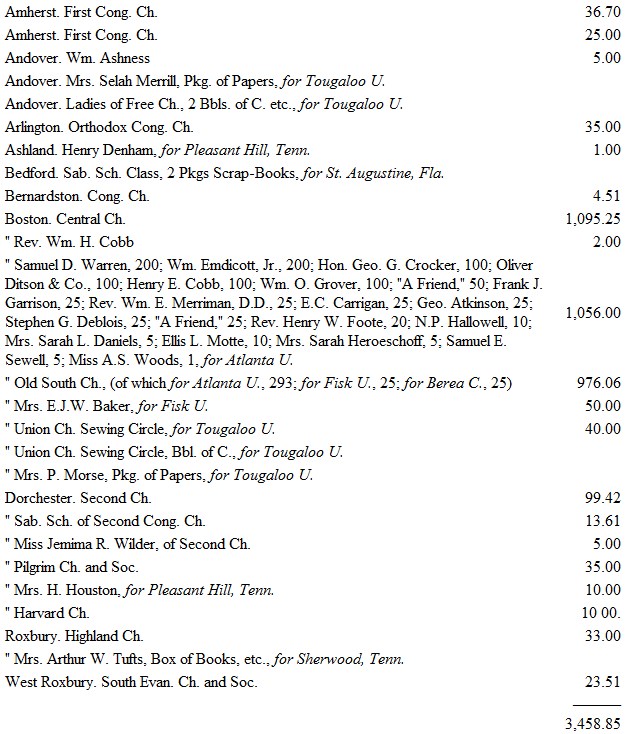
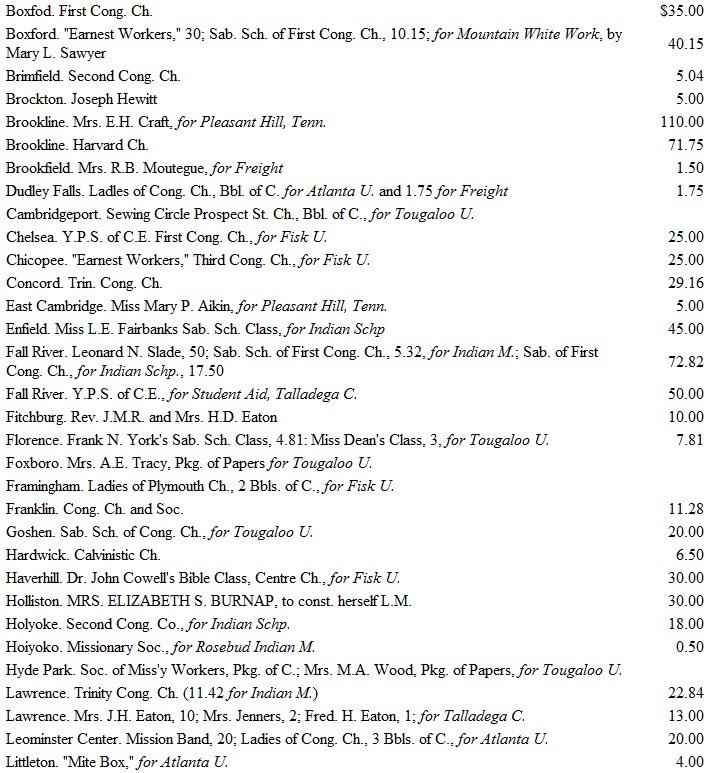
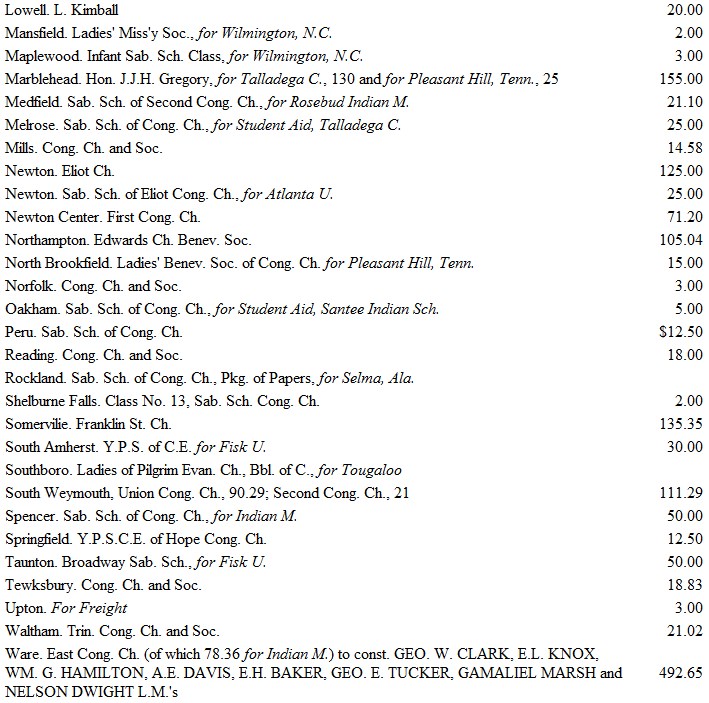

Philipps, Me. "Glad Helpers," 1 Bbl., for Williamsburg, Ky. South Berwick, Me. Ladies of Cong. Ch., 1 Bbl., for Wilmington, N.C. Boston, Mass. Miss H.H. Stanwood, 2 Boxes, for Grand View, Tenn. Newton, Mass. J.W. Davis, 1 Box Pittsfield, Mass. Free Will Soc. of First Ch., Box, for Atlanta U. Watertown, Mass. Ladies of Phillips Ch., 1 Bbl., for Pleasant Hill, Tenn.
RHODE ISLAND, $111.19
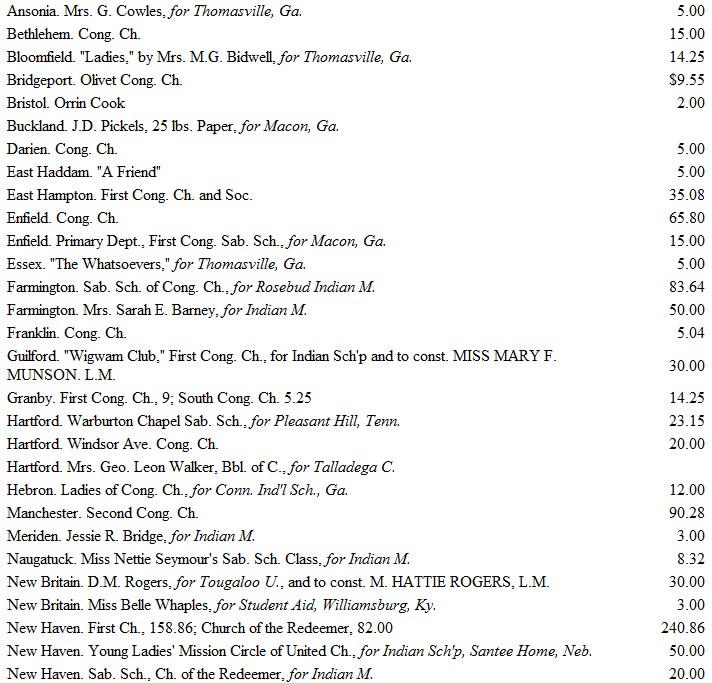
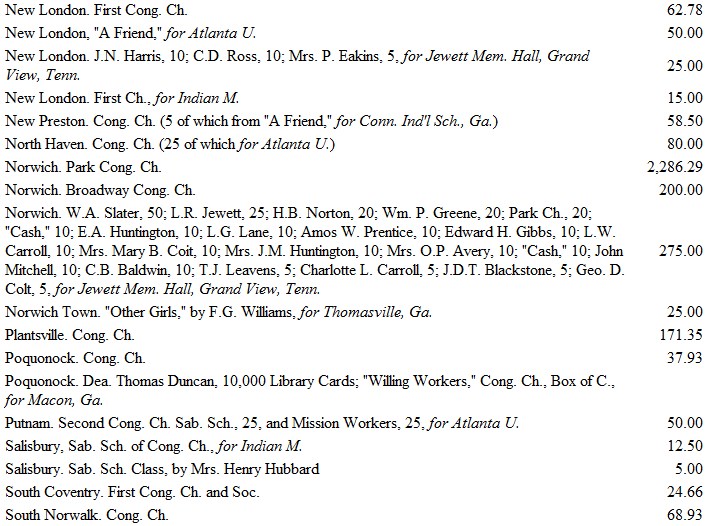
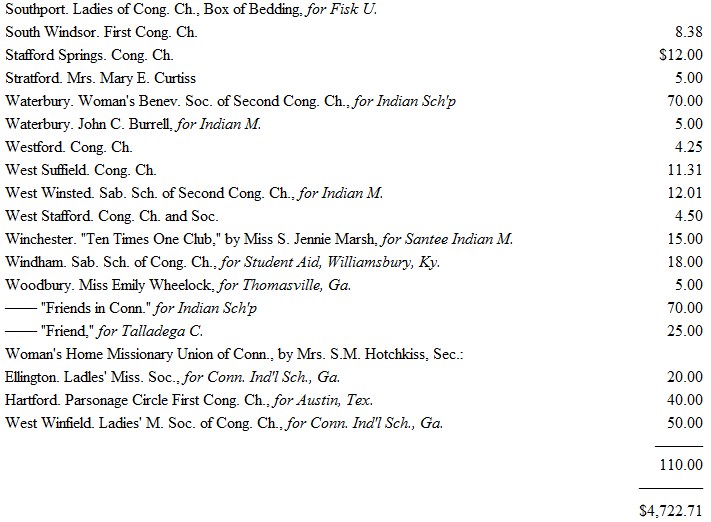

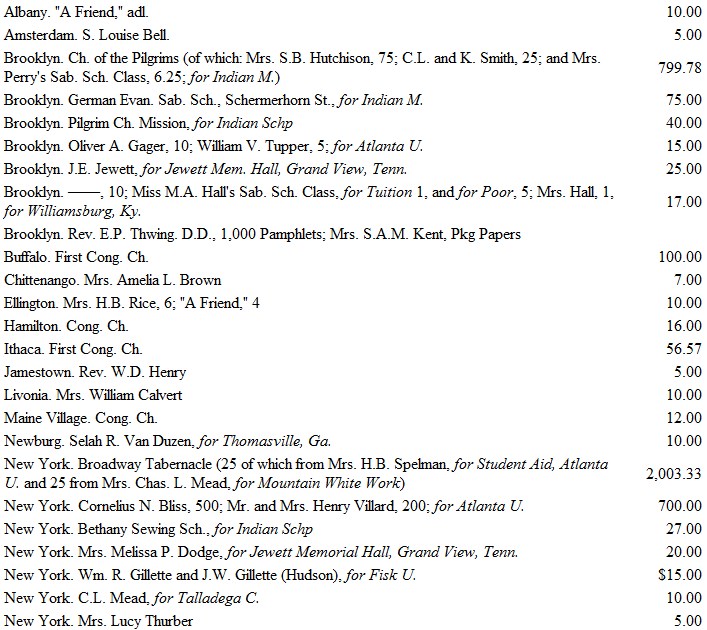






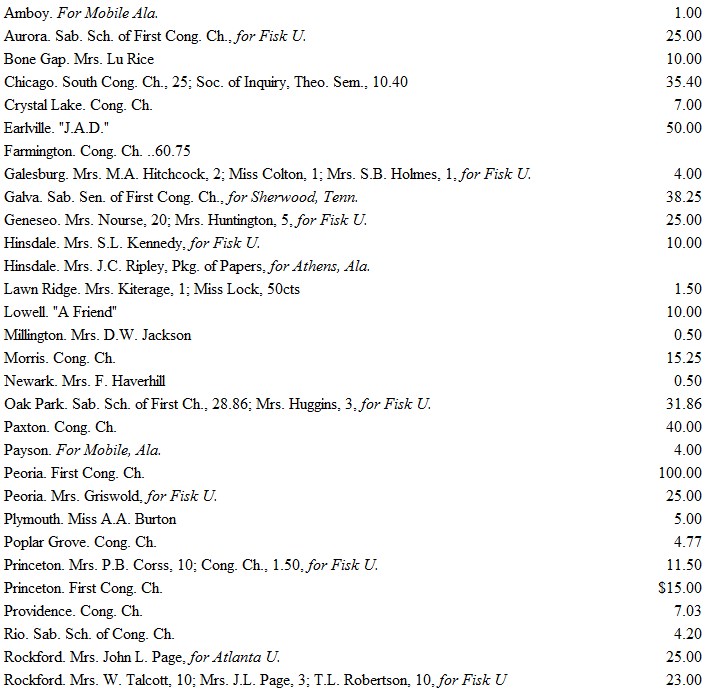

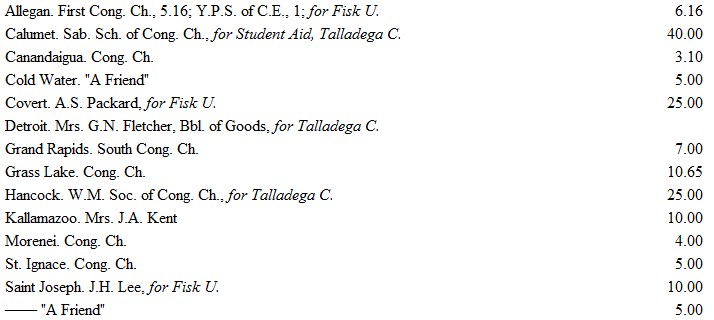
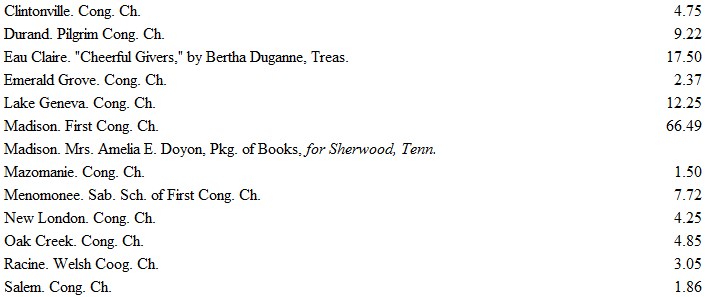
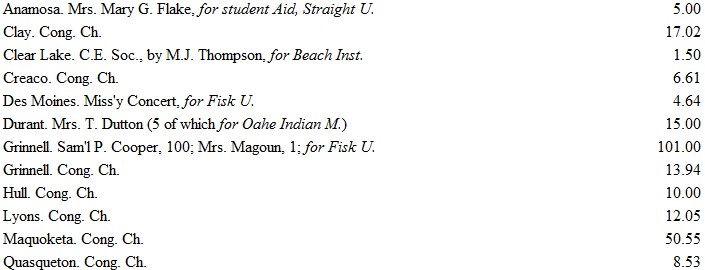
























from Oct. 1st, 1S87, to March 16th, 1838. E. Palache, Treas.:











